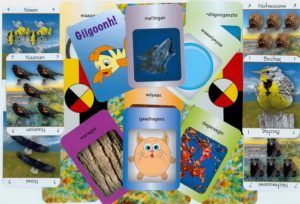Ojibwe card games fun for the whole family

By Karl Hele
Native Teaching Aids, a small business that believes in the vital importance of maintaining and revitalizing Indigenous culture, language, and history for Indigenous communities everywhere, produces a number of card games for learning aspects of the Ojibwe, Blackfoot, and Salish languages as well as history, treaties, and law. The games are produced in Montana and funded by the Montana Indian Language Preservation Project. All of the Ojibwe language games were created in association with the Little Shell Chippewa Tribe of Montana.
The four Ojibwe language games are Giigoonh – Ojibwe GoFish!, Asigibii’iganan – Ojibwe Numbers, Ishkodens – Ojibwe Matching Game, and Anishinaabemo – Speak Ojibwe Phrase Building Games. Giigoonh, Asigibii’iganan, and Ishkodens come in a travel or teaching size. Each deck of cards are printed on high quality card stock with glossy images.
In an effort to engage in language learning, I purchased three card games, a travel size Asigibii’iganan as well as teaching size Giigoonh and Ishkodens. The teaching size comes in a larger box with a few more cards, a glossary, and extended instructions compared to the travel size. I prefer the travel size for its portability and compact nature. The games themselves are simply Ojibwe language versions of popular card games which makes the game play easy since the basic rules of GoFish, for instance, are well known. Unfortunately, the cards do not include pronunciations. Although without the correct pronunciations one can learn the contained vocabulary visually, when listening to an Ojibwe speaker, it is very difficult to connect the visual knowledge as well as mispronunciations with the correct pronunciations. The printed cards’ use of the double vowel system and images; however, allow for local differences in pronunciation when playing with speakers of the language.
If you are like me and do not live in Anishinaabeg territory and do not have access to a language speaker to play with, it is still possible to learn to pronounce the words. When playing the games, I regularly combine the game with an online Ojibwe language dictionary that includes audio recordings for pronunciation. While it is not a perfect solution, the combination of the game with online audio helps greatly.
The fourth game, Anishinaabemo, which I do not own, is about building phrases for language beginners whereas the other three games are aimed at early learners and beginners. The card games that I own are excellent for reinforcing basic vocabulary if played regularly. The games, being easily played and recognizable, appeal to both adults and children thus making language learning a family affair.


